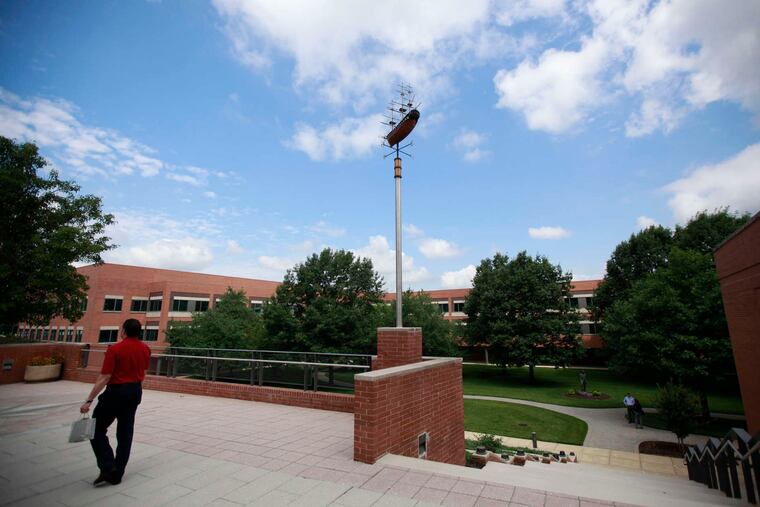Vanguard supervisor and brother-in-law stole over $2M from dead customers and dormant accounts, feds say
Scott Capps stole passwords from Vanguard colleagues, accessed the computer system to issue checks from dormant customers’ accounts, and had Vanguard mail the checks to his brother-in-law.

A former Vanguard Group supervisor stole more than $2 million by taking money from dead or inactive customers’ accounts before state treasurers could take custody of the unclaimed money, prosecutors say.
Scott Capps of Coatesville pleaded guilty to conspiracy to commit mail fraud, two counts of money laundering, and two years of false tax returns on Thursday before U.S. District Judge Michael M. Baylson. Federal prosecutors said Capps, who worked for 23 years for the Malvern-based investment giant, more than tripled his income for 2013 at customers’ expense, with help from his brother-in-law and other accomplices.
Sentencing guidelines call for a potential 46 years in prison, $2.1 million in restitution and a $1.25 million fine, though financial crimes rarely draw long sentences. Capps is free on bail pending sentencing June 26.
Capps was indicted by a federal grand jury in December, charged with drawing checks on Vanguard accounts between 2012 and 2014 using his employees’ stolen passwords.
Vanguard has around eight million U.S. retail investment customers and manages over $5 trillion in assets. Its CEO, Mortimer “Tim” Buckley, has said the firm is investing heavily in technology to improve its security, web access, and other legacy computer systems.
Capps left the company in 2014, according to his LinkedIn profile. The scheme might have continued after that, according to the indictment.
His brother-in-law Lance Tobin of Richboro was charged in 2016 and pleaded guilty. Tobin agreed to repay $1.89 million, court documents show. He is due to be released from a federal facility in New Jersey in September, according to the Bureau of Prisons.
Capps and Tobin must also forfeit property in West Berlin, N.J., and Coatesville, purchased with the theft proceeds, a federal forfeiture notice indicated. Tobin faces a judgment from the IRS as well, according to documents filed in Bucks County.
Prosecutor David Ignall declined to comment on why the case against Capps was initially filed under seal. Capps is represented by chief federal public defender Leigh M. Skipper.
Tobin’s case number was unsealed following a request of The Inquirer to Baylson. The complaint against him remains sealed. Other people “known and unknown” participated in the fraud, according to the Capps indictment.
Capps stole passwords from people who worked for him, accessed the computer system to issue checks from dormant accounts that were slated for “escheat,” to be transferred to state treasurers, and had Vanguard mail the checks to his brother-in-law and others not named in the suit.
Tobin and Capps deposited money taken from Vanguard accounts into accounts at Citizens Bank and PNC Bank, and then used the money to buy real estate. Capps also tried to delete any record of those checks being issued.
Capps under-reported his income for 2013 as just his Vanguard salary of $111,500, but failed to include stolen funds that totaled $270,000. For 2014, Capps reported a loss of $28,896 when in fact he had stolen $550,200 that year from Vanguard accounts.
When investment or bank account holders die or leave their accounts dormant for a long period, the money is turned over to state treasurers. Terms vary from state to state ― the waiting period is three years in Pennsylvania and New Jersey — and heirs may apply to get it back. Pennsylvania’s Treasury returned more than $200 million in escheated funds to Pennsylvanians in each of the past two years, according to a department spokesperson. There is no statute of limitations.
It’s unclear how the Vanguard scheme was discovered, or whether Capps was fired by Vanguard or left voluntarily.
“Given this is still a pending case, we cannot discuss specifics. As you noted, a former Vanguard employee, acting alone with an accomplice outside of the organization, pleaded guilty to mail fraud, money laundering, and other charges,” Vanguard spokesperson Carolyn Wegemann said in an email.
“This was an isolated incident that occurred five years ago,” she added. “No clients were adversely impacted (all original payees or their representatives received the money they were entitled to receive). We’ve further tightened and enhanced controls to protect our clients and the firm since the incident. Vanguard complied with all applicable state unclaimed property laws.”
Pennsylvania Treasury officials have not performed a compliance review of Vanguard’s handling of escheat funds, but state officials “have encountered some difficulty with how Vanguard handles retirement or investment accounts and their steps to ensure clients have not deceased,” said Treasury spokesperson Mike Connolly.
In 2016, two years after Capps left, Vanguard acknowledged to the Treasury that the company did not check death indexes to confirm when an account holder had died until customers had reached the mandatory age for withdrawals from federally regulated retirement accounts — typically 70½ — plus three years, after which Pennsylvania moves to collect unclaimed funds.
That policy “had the effect of keeping accounts open” for years after death in some cases, Connolly added, and fell short of what Treasury considers best practice.
In addition, federal “Know Your Customer” regulations require institutions that hold financial accounts to maintain current and valid customer contact information. Treasury has not had contact with Vanguard on the issue since 2016.
Vanguard hasn’t clarified whether the company used its own money to repay victims of the scheme, and has not specified the steps it took to prevent it from happening again.
Case documents don’t identify which Vanguard accounts were targeted, or in which states money was owed.
Pennsylvania’s Unclaimed Property Office has netted around $200 million annually in recent years from escheatment. Delaware, a legal-financial center, has used private contractors to escheat more than $400 million annually in recent years.